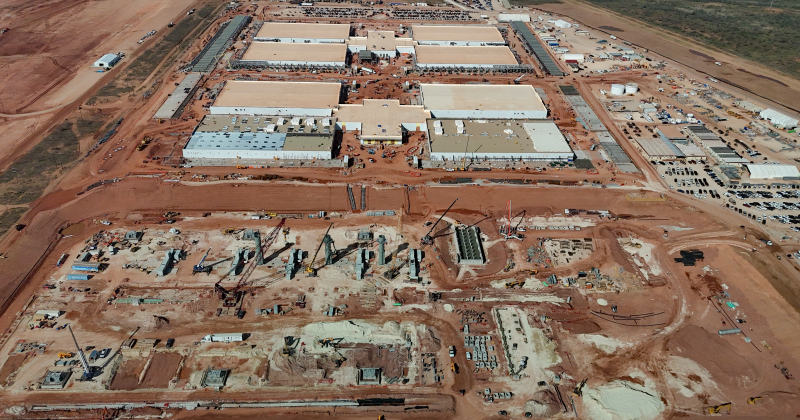Brookfield Provides $750M Credit Facility to Peter Thiel-Funded AI Data Centre Company Crusoe Energy

Palantir co-founder's VC fund led a $600M funding round for Crusoe just months ago. Crusoe wants to build new gas-powered data centres in Alberta.
'Wonder Valley' is far from the only proposal for a massive, gas-powered AI data centre in Alberta. US-based startup Crusoe Energy also hopes to get in on the fossil fuel burning free-for-all, and they're getting help from some big names.
In December 2024, for example, Crusoe raised $600 million in a Series D funding round led by none other than Founders Fund, Peter Thiel's venture capital firm.
Thiel, as many readers will already know, is co-founder of Palantir Technologies, the data analytics company providing software to help ICE kidnap civilians in the US for Trump's mass deportation program. Despite this, the President of Palantir Canada, David MacNaughton, is a member of Prime Minister Mark Carney's Council on Canada-U.S. Relations.
Then in March, Crusoe was handed $225 million in debt financing in a round led by NY-based firm Upper90. This round also included funding from the British Columbia Investment Management Corporation (BCI), which manages investments on behalf of BC's public sector pension funds. Peter Milburn, Chair of BCI's Board of Directors, was the province's Deputy Minister of Finance until being appointed to this position at the end of 2016 by BC's Minister of Finance.
This all might sound like an astonishing amount of money - an amount that could keep virtually a startup going for years. But Crusoe Energy, like so many other AI-related companies, is burning through its stacks of cash at an even more astonishing pace. And on 11 June 2025, Brookfield Asset Management provided Crusoe with access to a $750 million credit facility.
What is Crusoe doing with all this funding?
Crusoe Energy, which started out as a Bitcoin mining company, is currently building the second phase of a 1.2 gigawatt AI data centre facility in Abilene, Texas. The site, called the Lancium Clean Campus, features "backup" power generated by five on-site gas turbines, although it's not clear what proportion of its energy usage will ultimately come from what sources. The 'Clean Campus' branding remains, however.
As Bloomberg has reported, the ability to quickly construct facilities like this, connect them to the grid, install gas turbines, you name it, is in large part due to a lack of regulation of energy projects in Texas. And while this deregulated environment is attractive to companies like Crusoe, with their immense piles of cash and a desire to move fast and break things, the lack of public oversight comes at a heavy price: in 2021, six people died in Abilene County as a result of widespread blackouts during a severe winter storm. At least 51 others died in other parts of the state, and the property damage incurred due to the power outage is estimated to have cost Texans $195 billion.
Crusoe's Alberta plans
Crusoe Energy markets itself as having a "deep commitment to scaling AI infrastructure in a climate-aligned way", and uses "Clean Campus" branding to mask the fact that their Texas operations are powered, at least in part, by fossil fuels.
In keeping with this deep commitment to greenwash their image, Crusoe signed a 'framework agreement' (read: not a final contract) in February 2025 with Kalina Distributed Power, an Australian-owned gas plant company promising to build three 170 megawatt gas plants providing "affordable natural gas-fired power configured with CO2 capture and sequestration." But as we recently heard from O'Leary Ventures' CEO Paul Palandjian, carbon capture systems, even if they can reliably sequester carbon, are still non-viable in situations like these, because they increase the cost of the generated electricity to the point where data centre clients are no longer willing to pay for it.
And at least for the time being, even Danielle Smith is keenly aware of the dangers of an over-extended grid, and is reluctant to allow the construction of hyperscale data centres unless they supply their own electricity generation.
Three paths forward
So there are a few possibilities.
One is that Crusoe and Kalina will cancel their plans for Alberta data centres, despite having already acquired three parcels of land totalling 545 acres, and having conducted "environmental desktop and biophysical studies" at two of the three sites so far.
A second scenario is that the federal and/or provincial government could decide to provide AI-related projects with additional rebates and/or tax breaks if they implement CCS, beyond what they already provide (at present, the federal government provides a 50% rebate on the capital cost of carbon capture infrastructure, while Alberta kicks in 12%). Of course, this might be seen by Canadians as a bailout for Thiel and Brookfield using public money.
A third possibility: Crusoe and Kalina will forge ahead, build the gas plants and data centres, but abandon the plans for carbon capture & storage. This would line up with what's being proposed for another Kalina project in Alberta, where CCS would "possibly" be implemented “as legislative and commercial circumstances warrant.”
Who knows what will happen, but one thing's for sure: we should definitely maintain a healthy skepticism when evaluating the promises being made by companies looking to build these massive data centres.
